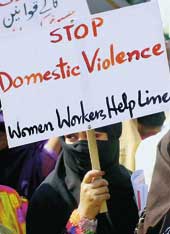 |
| SPEAKING OUT: Women demonstrators at a meeting (Photo: AFP) |
It all started with a conversation. Activist Ranjana Kumari was discussing a bill that sought to outlaw domestic violence with her counterpart from the United States, Terry Ann Rogers. The Domestic Violence (Prevention) bill had been carefully drafted and debated at great length ? but it was still to be enacted despite firm assurances from the erstwhile National Democratic Alliance government at the Centre.
?We got a bit complacent,? Ranjana Kumari ? the head of the New Delhi-based Centre for Social Research (CSR) ? told Rogers, the India programme manager of a non-profit US body, known only by the acronym, IFES. ?After Parliamentarians and the law minister assured us that the bill was just about to get passed, we relaxed. But before we knew it, Parliament?s session was over, the elections were on and the government had gone,? she said.
Rogers was equally appalled. ?But where were your lobbyists?? she asked Kumari. ?Surely they were pursuing the bill??
The CSR director explained that Indian women?s groups had no lobbies. It was then that she ? and a group of other activists ? paused to think about the need for a body that would advocate the cause of women with the country?s legislators. The Industry had its proponents ? outfits such as the Confederation of Indian Industry and the Federation of Indian Chambers of Commerce and Industry. Workers had trade unions, caste groups had their advocates and farmers had lobbies in Parliament. But where were the spokespersons for women?
That was the beginning of WomenPowerConnect (WPC) ? an idea that has been finding shape through a series of meetings held across the country since the idea was first mooted in June. The fifth of six regional meetings was held in Bangalore last Friday and Saturday and a meeting is scheduled in Chandigarh later this month. A national convention in Delhi in January 2005 will announce the formation of WPC, right now supported by CSR, IFES, the United Nations Development Fund for Women, International Centre for Research on Women, Action India and the National Centre for Advocacy Studies.
?WomenPowerConnect?s goal will be to dialogue with Members of Parliament and others in governance to get legislation passed,? says Ranjana Kumari.
The immediate priorities of the body are the domestic violence bill and a general budget that addresses women?s issues. Right now, only one per cent of the national budget is spent directly on women.
That domestic and other forms of violence against women is an issue that needs immediate attention is corroborated by the government?s own figures. According to the National Crime Record Bureau, there were 1,31,474 cases of crimes against women registered in 1998. In 2001, the figure had jumped to 1,43,795. The year 1998 saw 15,151 registered cases of rape; 2001 witnessed 16,075 such cases. The number of women tortured went up from 41,373 cases in 1998 to 49,170 in 2001.
Issues such as these came up at the Bangalore meeting, where local, regional and national priorities were discussed by activists from Karnataka, Kerala, Tamil Nadu and Andhra Pradesh. And the participants endorsed the concept of WPC as a mechanism for action.
In India, where, as Ranjana Kumari points out, the concept of lobbying is still viewed with some suspicion, WPC hopes to successfully convey the concerns of villagers to the highest decision-making bodies. Elsewhere in the world, women?s lobbies are making a difference. Rogers points out that in the United States and Europe, women?s lobbying groups have been making active interventions in policy decisions.
?Legislators need to be influenced,? says Rogers. ?Excellent advocacy has taken place in India. But what is missing is the presence of women in the capital ? national or state,? she says.
WPC hopes to bridge that gap. Its programmes will be finalised after the convention, but will be based on strategies voiced by participants at meetings in Ranchi, Goa, Jaipur, Shillong, Bangalore and Chandigarh. Lobbying, the meetings have stressed, essentially entails gathering information on a subject of concern, preparing position papers that are distributed to all those who have a say in legislation and then persuading lawmakers to enact bills that concern women and defeat those that adversely affect them.
The activists know that it is not going to be an easy task in a country where legislators themselves oppose bills that support women, as underlined by the strident political opposition to a proposed law that seeks to reserve 33 per cent of all seats in elected bodies for women. ?We are talking about new legislation when old laws are not implemented, and women have no idea of their rights,? says Kalpana Shetty, who works for the Samashakthi project in Kunigal in Karnataka. ?We had to struggle really hard, and for months, before men allowed their wives to attend even our village meetings,? she says. ?These days, of course, the women no longer seek permission,? she says.
But the drive for change, as Shetty?s own experience indicated, often end up moving mountains. Says a confident Ranjana Kumari: ?Let?s not just look at what?s wrong. It?s time we discussed what we can do.?











